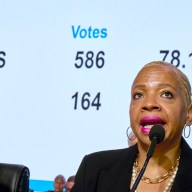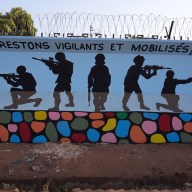 Supporters of FC Zenit St. Petersburg fire flares during the Russian Football League Championship match between FC Zenit St. Petersburg and FC Ural Sverdlovsk Oblast at the Petrovsky stadium on December 6, 2013.
Supporters of FC Zenit St. Petersburg fire flares during the Russian Football League Championship match between FC Zenit St. Petersburg and FC Ural Sverdlovsk Oblast at the Petrovsky stadium on December 6, 2013.
Credit: Getty Images
Events of Oct. 31, 2013 proved that Russia had no choice but to address its problem with hooligans in sport. A cup match between Spartak Moscow and Shinnik Yaroslavl had to be stopped due to a racially-charged battle between the supporters, during which the arena was vandalized, fires were lit and Nazi flags flew in the crowd.
Seventy-eight arrests were made that day, from over 14,000 at sporting events over the past three years according to official data. That’s too much for the hosts of the 2018 World Cup, and its deputy CEO Alexander Djordjadze demanded laws to “change the fan culture completely.”
On Jan. 19, the “Fan Law” came into effect. It allows for severe punishment of offenders; fines of over $300 (over half the average monthly wage), three-year bans, and sentences to community work. Repeat offenders can expect prison sentences and much larger fines. Clubs are expected to film and identify troublemakers.
But while there has been widespread relief that action has been taken, the rules have confused supporters.
“It’s unclear how the offenses will be differentiated and on what basis the court will address decisions concerning the offenders,” Alexander Shprygin, president of the Russian Soccer Fan Association (VOB), told Metro.
The changes were produced without consulting supporter groups, which have been regarded with open hostility. VOB leaders and headquarters have been searched and investigated in the past year. This has fueled wider concerns around growing securitization in sport, with a prominent example the severe restrictions around Sochi’s Winter Olympics, which have distressed much of the local community.
A further issue is whether the changes will have the desired impact.
“Our research shows that punishment of this type of hooliganism, involving racism and hate crimes, is rarely effective without educational measures,” said Piara Powar, executive director of Football Against Racism in Europe (FARE). “It can also cause a backlash.”
A World Cup or Olympic Games has always demanded that sporting values be a consideration along with security.
“Governments need to ensure that any legislation for sporting events makes an attempt to follow the Olympic Charter (on the spirit of sport),” says sports lawyer Gregory Ioannidis.
With the 2022 World Cup to be held in Qatar – renowned for its authoritarian government – a worrying precedent could be set.
Russia’s new system is unproven, and with little time before the big events, it represents an experiment. Visiting sports fans will play the guinea pigs.
















